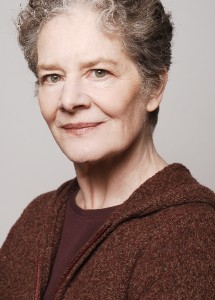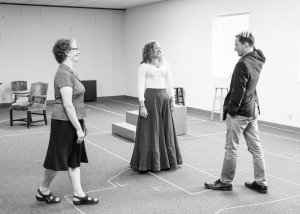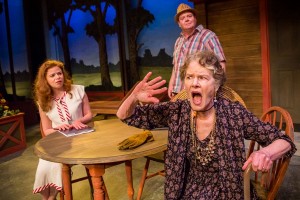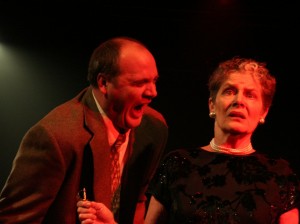A Conversation with JoAnn Johnson
 Portland Shakespeare Project spoke with director, actor and choreographer, JoAnn Johnson as rehearsals got underway for The Turn of the Screw, the second Main Stage production in PSP’s expanded 2015 season. Johnson brings her broad experience as director to the acclaimed Jeffrey Hatcher adaptation of the Henry James classic ghost story playing at PSP October 1-18.
Portland Shakespeare Project spoke with director, actor and choreographer, JoAnn Johnson as rehearsals got underway for The Turn of the Screw, the second Main Stage production in PSP’s expanded 2015 season. Johnson brings her broad experience as director to the acclaimed Jeffrey Hatcher adaptation of the Henry James classic ghost story playing at PSP October 1-18.
She is currently a Resident Artist at Artist Repertory Theatre where she has appeared onstage and directed numerous productions. Her prolific acting credits include Portland Center Stage, Arkansas Repertory Theatre, Insight Out Theatre Collective, Coho Productions, Tacoma Actors Guild, Profile Theatre, The Old Globe, The Empty Space, Pioneer Theatre, Utah Shakespeare Festival, Sacramento Theatre Company, San Jose Repertory Theatre, and many seasons with the Oregon Shakespeare Festival. She has directed at Theatre Vertigo, Northwest Classical Theatre Company, triangle productions!, Portland Actors Conservatory, Quintessence, University of Portland, Hellfire Productions and defunkt theatre. She has toured, taught, and served internationally as a cultural specialist.
This is the first time you’ve directed with Portland Shakespeare Project. Why this show for PSP at this time?
This is their first foray as a company into expanding their season beyond just one show, although they’ve done readings before and they’ve had a lot of ancillary education and outreach activities focusing on their Shakespeare project. But they wanted to explore expanding into a second offering.
Turn of the Screw is fairly minimal in terms of its scenic elements, props, costumes – the accouterments. The focus is supposed to really be on storytelling. And it’s a classic, it’s a really good story, it’s heightened language. So I think that’s why it seemed like such a good fit.
I was awfully glad (Michael Mendelson) asked me. I said yeah, I would be really interested in doing it. I got two really fantastic actors, Chris Harder and Dana Millican. They’re wonderful artists and really engaging and creative both of them, so I’m expecting a really wonderful rehearsal process.
Have you worked with either of them before?

JoAnn Johnson, Dana Millican, Chris Harder. The Turn of the Screw, Portland Shakespeare Project.
Photo Russell J. Young
I’ve worked with them both on stage as actors, I’ve never directed them.
I was with Chris in Ten Chimneys (at Artists Repertory Theatre). Dana I was with in Fifth of July at Profile.
So, we do have a relationship. I’m really excited about that. We had an open audition process and they were cast and that was that.
Because you do both so prolifically, is it ever a challenge to put the actor hat on vs. the director hat?
I don’t really have too much difficulty with that.
I think the process of learning to become a director has influenced my acting in a way. I’m a lot more aware; I would say it’s enlarged my awareness of what’s going on in the room. That can be a very, very useful and helpful tool to have – as long as you don’t start thinking that you can do it better. I think most of us in this profession have enough natural kind of humility and insecurity to balance out our arrogance that that doesn’t really happen.
In terms of the other way around, I love to sit in a room and watch good actors do their work. And when I’m sitting at my desk envisioning a production and how I might want to block it and arrange it and how I think the shape flows and what the rhythms are and so on, I think I draw on my own acting instincts. I think that’s just a natural thing to do. But I’m always surprised and delighted by what the actors can bring into the room.
I think it is two parts of the brain, but I don’t think they necessarily get in each other’s way.
I think no matter how many projects you’ve done as a director or as an actor, each one is a fresh beginning. You’ve got a certain body of experiences to draw upon, but it’s all new territory and it can seem very daunting no matter how many years you’ve been doing it!
When did you start directing?
I started directing in the early ‘90s, largely because Allen Nause, who I’ve known many years and worked with a lot in Ashland and elsewhere, said “you know I think you should try your hand at directing.” And so I did. And that was the beginning.
Was that at Artists Repertory Theatre?
Yes, it was at ART in the old days when the space was on the third floor of the Y downtown.
Have you acted or directed Hatcher before.
Ten Chimneys actually, the show I was in with Chris Harder, was by Jeffery Hatcher. Other than that, no.
(The Turn of the Screw) is a really compelling story. It seems simple on one hand but it’s incredibly complex when you dig inside it. It’s a very, very interesting project. I’m really enjoying working on it.

Abby Wilde, Todd Van Voris, JoAnn Johnson. “Ten Chimneys” Artists Repertory Theatre,
Photo: Owen Carey
Of all the adaptations of Henry James’ The Turn of the Screw – of which there have been many – have you watched or spent time with any or are you staying hands off as you are working on the play.
I’m staying pretty much hands-off still at this point. I just personally prefer to not to go back and watch the films because I don’t want to be too influenced by what I’ve seen and heard . . . yet. I like to kind of have the freedom to find my own way with the text. Other people would totally disagree with that. Although I did re-read several times the novella that (the play is) taken from. There are some really interesting differences. Being an adaptation, I think Hatcher’s done a brilliant job of transforming it into a theatrical, rather than a novella, form.
I think that it really captures the essence of the novella. The thing that I find most intriguing is if you read the history of the criticism of the novella that starts from the moment it was first published. There’s a huge amount of critical controversy about it. And most of it over the decades has focused on whether or not the ghosts are real or whether or not the governess is simply mad as a hatter. It was written largely pre-Freud, and in an era where at the same time spiritualism was considered a really valid scientific study. So I think it makes perfect sense that James would write something with both of those really complex ideas intertwined.
I love the metaphor of the “turn of the screw.” Something that turns around and you see things from different angles and that bores into you and gets into your skin and causes pain and anguish and so on.
I’ve always found myself when I’m directing or acting being most interested in scripts that live in a world that is in between – I don’t know quite how else to put that – but in between illusion and reality or even thematically, say, in the area between protection and control.
Like, at what point does protecting a child cross the line into control, and how as human beings do we navigate that sort of no-man’s land in the area of morality and ethics and what’s really, really right.
I think that this adaptation navigates that territory really well.
That’s what’s so fascinating about the story. That James leaves it up to the audience. The argument is left on the table – and like you say the criticism as well.
There are gender studies criticisms and Marxist criticisms, and they all find in the story grounds to support their view. (laughter)
Can’t we all.

Tim True, JoAnn Johnson, “No Exit.” Imago Theatre.
Photo: Jerry Mouawad
I think part of this story may be about the seed of an idea and how insidious that can be for good or evil depending on how it’s translated into action or interrelationship. If you were religious you would maybe call it an allegory instead of an evil. It almost might be an allegory of the travel between reality and imagination.
If someone believes that they’ve seen a ghost and no one else did, does that mean that it’s not real? What about the epistemology?
How do you define that language. So once you start down the slippery slope of this staircase it’s very complicated. Ultimately, the playwright – the adaptor – wants us to leave it ambiguous enough that the audience will take that journey.
Which is either frustrating or deliciously fun, depending on how you look at it.
I think he said somewhere, “give the audience something to argue about on the way home.” Which is always good.
In his writing, it’s not unusual for him to have a narrator who’s unreliable, and there are psychological explorations in his work and usually the work centers in some important way around moral and ethical questions and conflicts. So in that sense what seems like a simple ghost story really is in sync with his other writing.
Do you believe in ghosts?
I do. (laughter)
I believe in a ghost, that I saw and experienced. I believe that I saw one.
It could easily have been my imagination; you think of all these things. But it’s very clear what it was.
One of the actors said, “if you ask me if I believe in ghosts I probably wouldn’t say yes, but if you ask if I believe in spirits I would say yes, definitely.” I don’t know what the word for it is . . . but something was out there.
What can audiences expect from this production?
Wonderful writing. A very compelling, captivating story. Suspense. Some surprising humor. Brilliant acting, I would expect, from Chris and Dana. And very simple stagecraft in terms of costumes, set design, lighting design. The basic elements are perfect but it’s not a production that depends on a house bursting into flames or anything we’ve come to associate with a horror movie. There are no special effects really. But there is a great deal of attention to detail.
We have wonderful designers. Tim Stapleton’s doing the set, Sarah Gahagan’s doing the costumes, and Carl Faber is doing the lighting design. Hal Logan is assisting with the sound – although actually the playwright has asked for no electronic music and the sound effects are contained within the language of the script.
It’ll be an interesting, maybe somewhat unusual staging for a full theatrical production.
That’s a great team lined up.
The pre-production stuff has been really, really fun.
It sounds like a perfect selection for Portland Shakes as a second production – the creative team, the actors, the time of year . . .
(laughter) Yes, the time of year.
I really do have a strong feeling that it’s a good choice in terms of the terrific language, and the way that the adaptation has turned it into a very active story.
Well, thank you so much for your time today. What a treat.
You’re most welcome. I enjoyed talking to you.
